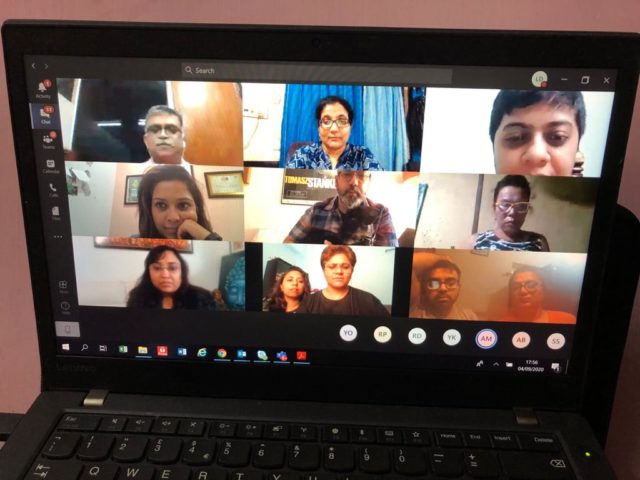Ahead of the second anniversary of the Honourable Supreme Court of India’s verdict that decriminalised Section 377 of the Indian Penal Code, the British Deputy High Commission, University of Sussex, UK and gender and sexuality non-profit Varta Trust, Kolkata jointly organized an online roundtable on the urgent employment and skills building needs of gender and sexual minorities, particularly those who are part of the informal or unorganized sector, which still employs more than 80 per cent of India’s workforce.

In his welcome remarks, Yemi Odanye, Deputy Head of Mission, British Deputy High Commission, Kolkata, underlined the significance of the event in light of the equal opportunity needs of gender and sexual minorities in a post-decriminalization environment. Beth Yates, First Secretary Political Affairs, British Deputy High Commission, Mumbai and LGBTQ Lead, India Network, in her keynote address said, “the impact of natural calamities like the coronavirus pandemic, the associated lockdown, and the Amphan cyclone have worsened the socio-economic precarity for large sections of gender and sexual minorities. The UK government remains committed to partnering with the Indian government and civil society to encourage greater economic inclusion of gender and sexual minorities.”
The roundtable saw a vigorous exchange of ideas in looking at the world of work through the lens of human rights, redefining the workplace beyond the corporate offices. It focused on mapping of skills, mentorship for LGBTQ entrepreneurs in thinking global but also exploring local business links, learning about a wide range of government livelihood and skills building schemes, continued barriers faced by LGBTQ people in accessing these schemes and financial inclusion, picking up the ropes of ‘soft’ skills and digital marketing, identifying business opportunities in sectors that are likely to provide sustainable business opportunities like agri-products and hospitality, and even looking at the business and employment potential of the community kitchens started during the lockdown by transgender support groups in different parts of India.
This roundtable was a follow up to a previous consultation on economic inclusion hosted by the British Deputy High Commission in January 2019, and it started with the launch of the report of the earlier consultation – Guidelines for Economic Inclusion of Gender and Sexual Minorities in India Beyond the Corporate World. The roundtable included LGBTQ peer leaders, entrepreneurs (including those from LGBTQ communities), social researchers, development sector professionals engaged in policy advocacy, and government and corporate sector representatives from in and around Kolkata, Imphal, Delhi and Mumbai.
Dr. Paul Boyce, Senior Lecturer in Anthropology and International Development, University of Sussex, and Pawan Dhall, Founding Trustee, Varta Trust, who have been collaborating on research and advocacy on economic inclusion of gender and sexual minorities since 2014, and in community work in Kolkata since the 1990s, spoke about the lessons learnt from their work together in a project titled Sexual and Gender Diversity, Welfare and Precarity in India: Impact, Advocacy and Process. This project was implemented in Manipur in partnership with state level transgender collectives All Manipur Nupi Maanbi Association and Empowering Trans Ability, and underscored the need to look beyond formal sector workplaces to the reality of the large majority of LGBTQ individuals in self-employment or working with little job security in the informal sector while simultaneously dealing with stigma and discrimination around their gender and sexuality.
Transgender activist Santa Khurai spoke about the impact of the lockdown on the beauty parlours run by transgender women in Manipur not just in terms of loss of income but also worsening of family violence. LGBTQ entrepreneurs Suchandra Das, Sree, Sudeb Sadhu and Avinaba Dutta narrated their experiences of running businesses (before and during the lockdown) in digital marketing, photography and videography, agri-products and handicrafts. They shared that their objective of starting these enterprises included providing other LGBTQ individuals with livelihood and skills building opportunities, and said that apart from the risks involved in running any business, they also had to factor in social stigma as a risk factor in achieving success.
The other participants included Surajit Sikdar, Assistant Director, Skills Innovation, National Institute of Rural Development and Panchayati Raj, Ministry of Rural Development, Government of India, Delhi; Amrita Roy Chowdhury, Director, Transcendent Knowledge Society and Sip N Bite, Kolkata; Aparna Mittal, Founder, Samana, Centre for Gender, Policy and Law, Delhi; Devidyuti Ghosh, hospitality professional from Kolkata; and Koel Chatterji, Meow Baari – Cat Crèche, Kolkata. Each one of them heard the LGBTQ peer leaders and entrepreneurs speak, and offered information about government schemes and business suggestions in dealing with barriers to livelihood and employment opportunities.
